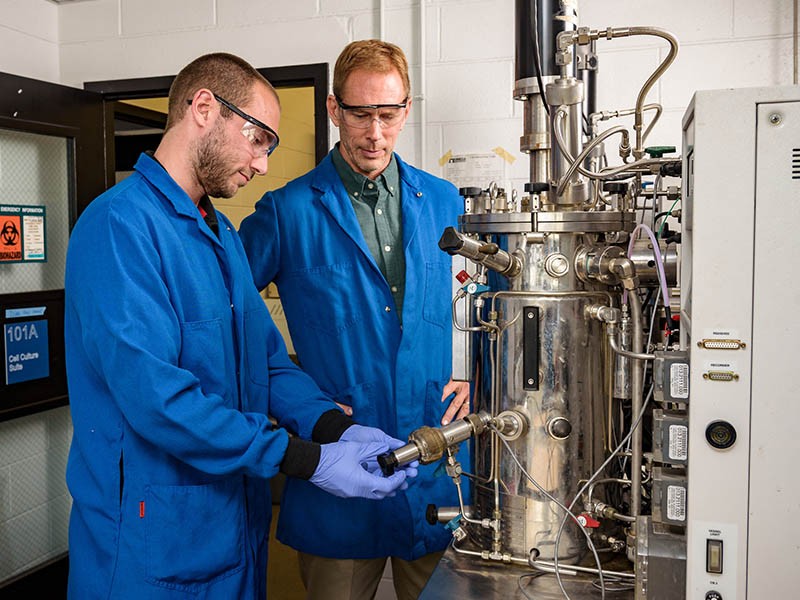Newly Renamed Department of Chemical and Biological Engineering Sets Course

Significant changes are underway in Villanova University’s Department of Chemical Engineering. Intended to reflect the changing nature of chemical engineering in industry and meet the demands of constituents, the department will undergo a name change and change in the course curriculum.
Department Chair and Associate Professor Noelle Comolli, PhD, provides the historical context: “The department was established in 1919 in response to the post-World War I boom, which saw the expansion of chemical and materials manufacturing. A hundred years later, the demand for manufacturing in the United States is moving away from petroleum toward alternative energies, pharmaceuticals and biologics.” The research focus and expertise of department faculty has shifted to match this trend, with almost half working in these new areas.
In response to Dr. Comolli’s proposal, the University provost and College of Engineering interim dean approved renaming the department to incorporate Biological Engineering. The Department of Chemical and Biological Engineering better positions the College with prospective undergraduates who are increasingly interested in these newer fields. “They regularly ask why we don’t have a biomedical program,” says Dr. Comolli. “In fact, we have many of the courses they’re looking for, but they’re not called out separately from Chemical Engineering.”
NovaCell, the Center for Cellular Engineering, is evidence of the College’s commitment to this burgeoning industry. Launched in spring 2018, NovaCell has already driven a change in the electives being offered that interest these students, including cellular and protein engineering. In addition, minors can be earned in Biomedical Engineering, a multidisciplinary program, or Biochemical Engineering, in which the department also offers a master’s degree.
In addition to attracting students, the department’s name change should also resonate with employers, particularly in the Philadelphia area where the pharmaceutical and biologic industries have a particularly strong presence. These same employers are part of the impetus behind the department’s curriculum changes, which primarily involve adjusting the timing of when specific courses are taken. Having classes like Thermodynamics I and II and Technical Communications prior to their junior year, “should improve our student’s successful placement rate in internships,” notes Dr. Comolli. Additional technical courses taken as juniors should also provide students with the technical content needed to have successful internships.
The changes to the curriculum have the added benefit of creating an option for a co-op and/or study abroad experience. Dr. Comolli explains: “Many of our graduating seniors have shown an interest in taking positions in the pharmaceutical industry in the Philadelphia area. The challenge in placing them in these companies is the employer’s desire for a student to have had a co-op experience; currently we have no mechanism for them to do that.” Reorganizing the curriculum and offering the senior design course in both the fall and spring semesters will open the fall semester of the senior year, allowing students to have a co-op from June–December of that year. “This will hopefully create a major increase in our job placement rates post-graduation,” she adds. This same opening can allow for students to potentially study abroad that semester as well.
Dr. Comolli expects the change to the department name and updates to the curriculum will have long lasting benefits for both the College and University in terms of attracting prospective students. Even more importantly, they will benefit classes of incoming students who will have increasing options and opportunities when seeking internships and jobs after graduation.
